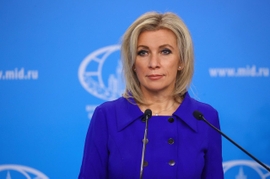The State Service of Special Communication and Information Security of Azerbaijan is preparing to launch a new “Anti-DDoS” system, designed to provide advanced protection against cyberattacks, in order to strengthen the cybersecurity of state institutions.
The announcement of this initiative was made during the “Third Summit Meeting of IT Leaders of State Institutions” last Friday, where Tural Mammadov, a senior official at the service, outlined the forthcoming cybersecurity measures.
“This system will ensure better protection of state institutions against cyberattacks,” Mammadov said, according to AZERTAC.
The introduction of the “Anti-DDoS” system comes in response to the escalating number of cyberattacks targeting the country’s state institutions. Its primary goal is to shield these institutions from the ever-evolving threats of cyberattacks, thereby creating a safer digital environment for state operations.
In 2023, the State Service of Special Communication and Information Security achieved significant success in defending government websites against malicious attempts. They managed to block nearly 911.5 million harmful links and neutralize about 7.1 million malicious entities. These efforts played a crucial role in fortifying the cybersecurity landscape of governmental digital resources.
Furthermore, the protection measures implemented by the service led to the identification and removal of 1.1 million malicious files through a sophisticated file analysis system. This proactive approach effectively prevented end-users from downloading and using hazardous files.
During the event last week, Mammadov also shared insights into the expansion of internet information resources within Azerbaijan’s state bodies. He highlighted the activation of 119 new domains and 323 subdomains as part of these efforts.
Meanwhile, cybersecurity remains a critical concern globally. According to the 2024 National Cyber Security Index compiled by the Estonia-based e-Governance Academy non-commercial fund, Azerbaijan ranks 12th among 31 countries. Additionally, the country holds the 40th position in the Global Cyber Security Index.
Azerbaijan’s cybersecurity policy in strategic indicators scored 12 out of 15 points in the index, indicating an 80 percent efficiency rate. Key areas such as cybersecurity of critical information infrastructure and the protection of personal data are fully addressed as part of preventive cybersecurity measures.
The responsive cybersecurity indicators of Azerbaijan stand at 100 percent in military cyber defense. However, the rates of cyber incident response and the fight against cybercrime are 79 percent and 81 percent, respectively.
The overall indicators in the recent National Cyber Security Index reflect the highest cybersecurity assessments of Azerbaijan. Nonetheless, the cybersecurity landscape is expected to face increasing complexity and evolving threats in 2024.
Forbes predicts a rise in ransomware attacks, increased AI-powered attacks, vulnerabilities in the Internet of Things, threats from quantum computing, additional supply chain attacks, and other cybersecurity challenges worldwide in the coming year.







 U.S. Secretary of State Antony Blinken reiterated Washington’s unwavering support for the ongoing peace process between Azerbaijan and Armenia in a...
U.S. Secretary of State Antony Blinken reiterated Washington’s unwavering support for the ongoing peace process between Azerbaijan and Armenia in a...
 The Iranian and Cuban transport ministers have discussed expanding maritime and air transportation cooperation.
The Iranian and Cuban transport ministers have discussed expanding maritime and air transportation cooperation.
 Kyrgyzstan has joined the extensive reconstruction efforts in the Karabakh region of Azerbaijan, after a series of mega initiatives were launched b...
Kyrgyzstan has joined the extensive reconstruction efforts in the Karabakh region of Azerbaijan, after a series of mega initiatives were launched b...
 Iran is moving to fortify its eastern border with Afghanistan in a bid to fight illegal migration and drug trafficking, along with enhancing security.
Iran is moving to fortify its eastern border with Afghanistan in a bid to fight illegal migration and drug trafficking, along with enhancing security.



